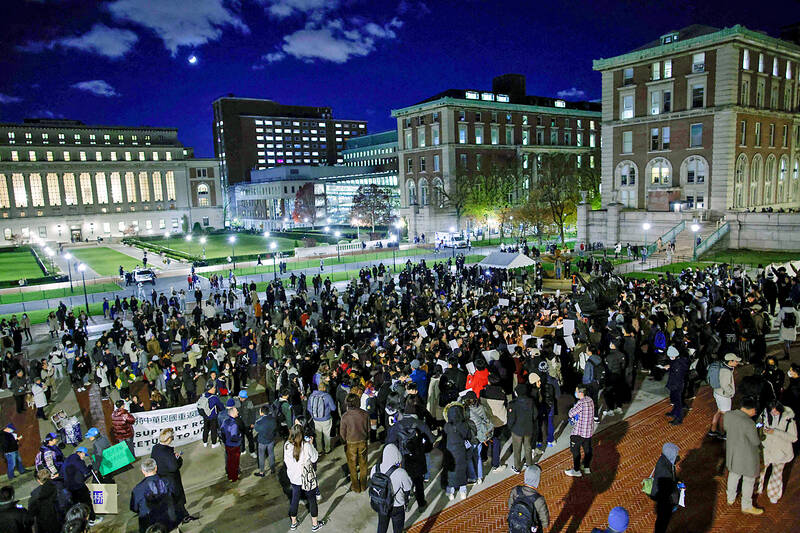Chinese universities sent students home and police fanned out in Beijing and Shanghai to prevent more protests yesterday after crowds angered by severe anti-virus restrictions called for Chinese President Xi Jinping (習近平) to resign in the biggest show of public dissent in decades.
Authorities have eased some controls after demonstrations in at least eight mainland cities and Hong Kong — but showed no sign of backing off their larger “zero COVID” strategy that has confined millions of people to their homes for months at a time. Security forces have detained an unknown number of people and stepped up surveillance.
With police out in force, there was no word of protests yesterday in Beijing, Shanghai or other major mainland cities. A far smaller group gathered at the University of Hong Kong to protest virus restrictions.

Photo: AFP
Beijing’s Tsinghua University, where students rallied over the weekend, and other schools in the capital and the southern province of Guangdong said they were protecting students from COVID-19 by sending them home. However, dispersing them to far-flung hometowns also reduces the likelihood of more demonstrations.
Beijing Forestry University also said it would arrange for students to return home. It said its faculty and students all tested negative for the virus.
Universities said classes and final exams would be conducted online.
In Shanghai, police stopped pedestrians and checked their phones on Monday night, a witness said, possibly looking for apps such as Twitter that are banned in China or images of protests. The witness, who insisted on anonymity for fear of arrest, said he was on his way to a protest, but found no crowd there when he arrived.
Sympathy protests were held overseas, and foreign governments called on Beijing for restraint.
US Secretary of State Antony Blinken told reporters that Washington’s position on the protests in China was the same as it was for demonstrations anywhere.
“We support the right of people everywhere to peacefully protest, to make known their views, their concerns, their frustrations,” he said yesterday in Bucharest.
In London, the British government summoned Chinese Ambassador to the UK Zheng Zeguang (鄭澤光) as a protest over the arrest and beating of a BBC journalist in Shanghai.
British Secretary of State for Foreign, Commonwealth and Development Affairs James Cleverly, who was attending a NATO summit in Bucharest, said that “it is incredibly important that we protect media freedom. It is something very, very much at the heart of the UK’s belief system.”
Chinese Ministry of Foreign Affairs spokesman Zhao Lijian (趙立堅) disputed the UK’s version of events, saying Edward Lawrence failed to identify himself as a journalist and accusing the BBC of twisting the story.
Asked about criticism of the crackdown, Zhao defended Beijing’s anti-virus strategy and said the public’s legal rights were protected by law.
The government is trying to “provide maximum protection to people’s lives and health while minimizing the COVID impact on social and economic development,” he said.

The Central Election Commission has amended election and recall regulations to require elected office candidates to provide proof that they have no Chinese citizenship, a Cabinet report said. The commission on Oct. 29 last year revised the Measures for the Permission of Family-based Residence, Long-term Residence and Settlement of People from the Mainland Area in the Taiwan Area (大陸地區人民在台灣地區依親居留長期居留或定居許可辦法), the Executive Yuan said in a report it submitted to the legislature for review. The revision requires Chinese citizens applying for permanent residency to submit notarial documents showing that they have lost their Chinese household record and have renounced — or have never

A magnitude 5.6 earthquake struck off the coast of Yilan County at 12:37pm today, with clear shaking felt across much of northern Taiwan. There were no immediate reports of damage. The epicenter of the quake was 16.9km east-southeast of Yilan County Hall offshore at a depth of 66.8km, Central Weather Administration (CWA) data showed. The maximum intensity registered at a 4 in Yilan County’s Nanao Township (南澳) on Taiwan’s seven-tier scale. Other parts of Yilan, as well as certain areas of Hualien County, Taipei, New Taipei City, Taoyuan, Hsinchu County, Taichung and Miaoli County, recorded intensities of 3. Residents of Yilan County and Taipei received

Taiwan has secured another breakthrough in fruit exports, with jujubes, dragon fruit and lychees approved for shipment to the EU, the Ministry of Agriculture said yesterday. The Animal and Plant Health Inspection Agency on Thursday received formal notification of the approval from the EU, the ministry said, adding that the decision was expected to expand Taiwanese fruit producers’ access to high-end European markets. Taiwan exported 126 tonnes of lychees last year, valued at US$1.48 million, with Japan accounting for 102 tonnes. Other export destinations included New Zealand, Hong Kong, the US and Australia, ministry data showed. Jujube exports totaled 103 tonnes, valued at

BIG SPENDERS: Foreign investors bought the most Taiwan equities since 2005, signaling confidence that an AI boom would continue to benefit chipmakers Taiwan Semiconductor Manufacturing Co’s (TSMC, 台積電) market capitalization swelled to US$2 trillion for the first time following a 4.25 percent rally in its American depositary receipts (ADR) overnight, putting the world’s biggest contract chipmaker sixth on the list of the world’s biggest companies by market capitalization, just behind Amazon.com Inc. The site CompaniesMarketcap.com ranked TSMC ahead of Saudi Aramco and Meta Platforms Inc. The Taiwanese company’s ADRs on Tuesday surged to US$385.75 on the New York Stock Exchange, as strong demand for artificial intelligence (AI) applications led to chip supply constraints and boost revenue growth to record-breaking levels. Each TSMC ADR represents